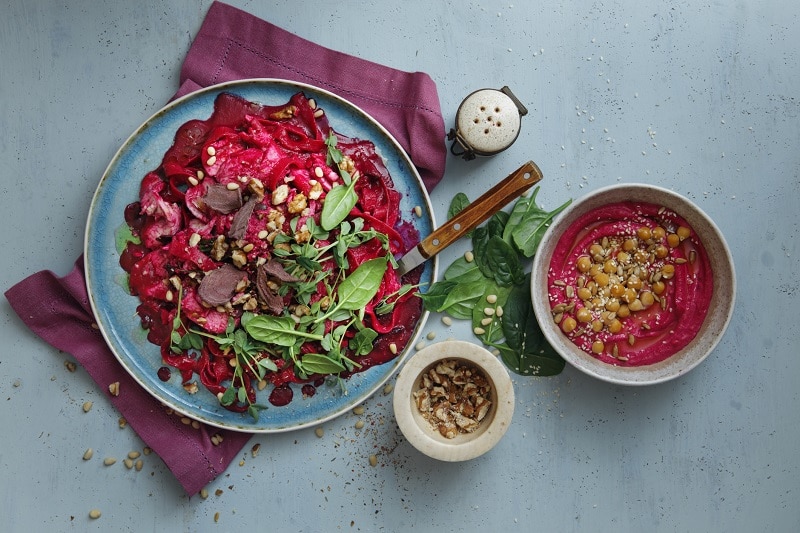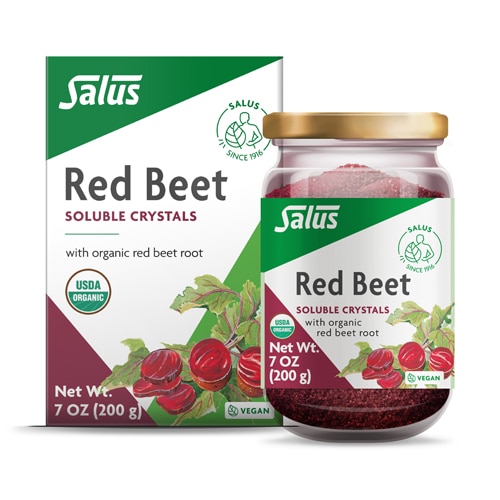When was the last time
beets made an appearance in your meal? For some of you recent, for some it has been a while and maybe for some not at all. You have been leery to try for various reasons. Let me challenge you to not judge a beet by its color, taste or texture. Instead, focus on the many
health benefits and nutrients it can provide for you. Hopefully this article will entice you to get out of your vegetable rut and add this versatile root veggie to your rotation with some appetizing recipes.
 Benefits of beets
Benefits of beets
Beets boast an impressive nutritional profile. They are low in calories and high in valuable vitamins and minerals that you need. An overview of the nutrients found in
3.5 oz. (100 g) serving of cooked beetroot are as follows:
Calories: 44
Protein: 1.7 g
Fat: 0.2 g
Water: 87%
Fiber: 2 g
Vitamin C: 6% RDI (reference daily intake)
Folate: 20% RDI
Vitamin B6: 3% RDI
Magnesium: 6% RDI
Potassium: 9% RDI
Phosphorous: 4% RDI
Manganese: 16% RDI
Iron: 4% RDI
Beets are a good source of
manganese and an excellent source of folic acid.
Beets contains compounds such as nitrates, betaine and pigments called betalains, which have several health benefits.
Nitrates are converted into nitric oxide. Nitric oxide is a vasodilator that relaxes and widens blood vessels.
Betaine is a nutrient made from the B-complex vitamin choline. Betaine is essential for many cell functions and protects against oxidative stress which can damage cells.
Betalains give beets their rich red color. It is a phytonutrient produced by plants that has powerful antioxidant and anti-inflammatory properties.
Red and purple beets are especially high in a type of betalain called betacyanins.
Yellow or
golden beets are packed with a different group of betalain called betaxanthins. These color beets decrease the chance of beeturia, pink or red colored urine.
Quick nutrition facts
- Beets contain a high concentration of nitrates which have a blood pressure lowering effect. This may lead to a reduced risk of heart attacks, heart failure and stroke.
- Eating beets may enhance athletic performance by improving oxygen use and time to exhaustion. To maximize their effects, beets should be consumed 2-3 hours prior to training or competing.
- Beets may have several anti-inflammatory effects. On-going inflammation in the body is linked to several diseases including type 2 diabetes, high blood pressure, heart disease, asthma and obesity.
- Beets are a good source of fiber (3.4 grams in one cup) and along with the water content, is beneficial for digestive health. Fiber has been linked to a reduced risk of chronic disease including colon cancer, heart disease and type 2 diabetes. Digestive conditions such as diverticulitis and gastroesophageal reflux disease could be prevented.
- Beets contain nitrates, which may help increase blood flow to the brain, improve cognitive function and possibly reduce the risk of However, more research in this area is needed.
- Beets are rich in water content and fiber. This can help keep you fuller longer and better hydrated, which can also help with feelings of fullness. Beets have the added benefit of being low in calories. All these properties are beneficial for weight loss.
Simple and delicious ways to enjoy beets
Choose beets that are heavy for their size with fresh, unwilted green leafy tops still attached. The leafy green tops are also incredibly tasty and nutritious. They are a rich source of folate and mineral such as calcium and iron. Beet greens are wonderful and can be cooked and enjoyed like spinach-sauteed in olive oil with seasoning of choice as a side dish, tossed into a salad or mixed with pasta.
Beets are amazingly versatile and are fabulous boiled, juiced, roasted, steamed or pickled. They can be bought precooked and canned for convenience.
Grab a glass.
Beet juice can be a good way to kick up the beets if you are using them for a brain boost or athletic enhancement. Fresh beetroot juice is best. Why not give
Certified Organic Beetroot Juice a try? There is no sugar added and contains only two ingredients.
Beetroot powder is an option to get an energy burst that can be mixed in cold water, juice or beverage of your choice.
Roasting beets bring out their earthy-sweet goodness. Consider slicing them thin and dry them in the oven to make
crunchy beet chips. When purchasing, avoid beet chips fried in oil and loaded with salt. Check the ingredients on things like
beet crackers or thins. Sometimes, the only beet they contain comes from a sprinkling of beet powder.
Beets are tasty raw in salads and slaws.
Grated beets make a flavorful and colorful addition to toss salads and coleslaw.
Beets blended with Greek yogurt or
hummus makes a pink dip that is lively, enjoyable and healthy.
10 beet recipes we love
Are you ready now to get out of your green vegetable comfort zone and give the mini rainbow-colored beet a first or second chance? With these recipes, you will not be disappointed.
1.
Roasted Beets and Beet Greens with Mustard Vinaigrette
2.
Roasted Beet Hummus
3.
Meatless Chickpea-Beet Burgers
4.
Fettuccine with Roasted Beet Sauce
5.
Roasted Harvest Vegetables
6.
Winter Caprese Salad
7.
Winter Veggie Pita Pizza
8.
Savory Paleo Beetroot Crepes
9.
4-Layer Millet & Roasted Beet Salad
10.
Vanilla & Roasted Beet Ice Cream
 Benefits of beets
Benefits of beets


